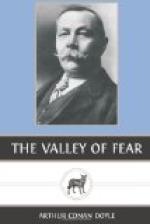“I was going to propose it, Mr. Holmes; but I thought it well to put you in touch with all the facts before we go. I suppose if anything should strike you—” White Mason looked doubtfully at the amateur.
“I have worked with Mr. Holmes before,” said Inspector MacDonald. “He plays the game.”
“My own idea of the game, at any rate,” said Holmes, with a smile. “I go into a case to help the ends of justice and the work of the police. If I have ever separated myself from the official force, it is because they have first separated themselves from me. I have no wish ever to score at their expense. At the same time, Mr. White Mason, I claim the right to work in my own way and give my results at my own time—complete rather than in stages.”
“I am sure we are honoured by your presence and to show you all we know,” said White Mason cordially. “Come along, Dr. Watson, and when the time comes we’ll all hope for a place in your book.”
We walked down the quaint village street with a row of pollarded elms on each side of it. Just beyond were two ancient stone pillars, weather-stained and lichen-blotched, bearing upon their summits a shapeless something which had once been the rampant lion of Capus of Birlstone. A short walk along the winding drive with such sward and oaks around it as one only sees in rural England, then a sudden turn, and the long, low Jacobean house of dingy, liver-coloured brick lay before us, with an old-fashioned garden of cut yews on each side of it. As we approached it, there was the wooden drawbridge and the beautiful broad moat as still and luminous as quicksilver in the cold, winter sunshine.
Three centuries had flowed past the old Manor House, centuries of births and of homecomings, of country dances and of the meetings of fox hunters. Strange that now in its old age this dark business should have cast its shadow upon the venerable walls! And yet those strange, peaked roofs and quaint, overhung gables were a fitting covering to grim and terrible intrigue. As I looked at the deep-set windows and the long sweep of the dull-coloured, water-lapped front, I felt that no more fitting scene could be set for such a tragedy.
“That’s the window,” said White Mason, “that one on the immediate right of the drawbridge. It’s open just as it was found last night.”
“It looks rather narrow for a man to pass.”
“Well, it wasn’t a fat man, anyhow. We don’t need your deductions, Mr. Holmes, to tell us that. But you or I could squeeze through all right.”
Holmes walked to the edge of the moat and looked across. Then he examined the stone ledge and the grass border beyond it.
“I’ve had a good look, Mr. Holmes,” said White Mason. “There is nothing there, no sign that anyone has landed—but why should he leave any sign?”
“Exactly. Why should he? Is the water always turbid?”
“Generally about this colour. The stream brings down the clay.”




